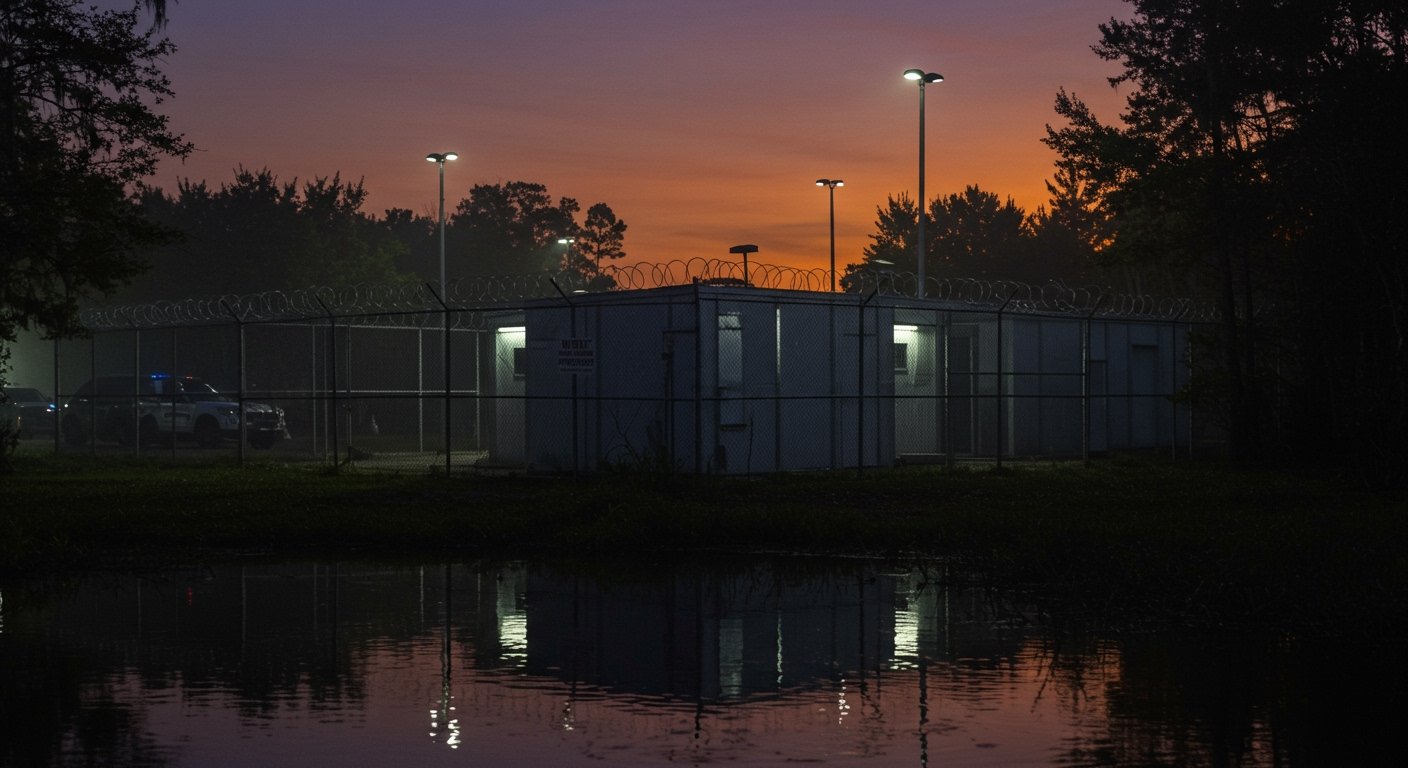Washington D.C. – The United States Department of Homeland Security (DHS) has initiated legal proceedings in a federal court, taking explicit action to formally distance the Trump administration from a temporary detention center in Florida that has garnered national attention, often referred to colloquially as “Alligator Alcatraz.”
The move, confirmed by a statement from the department that has been widely cited in various news reports, comes as the facility reportedly received its first group of immigrant detainees. The timing of the court filing suggests an immediate effort by the federal government to clarify the nature and extent of its involvement, or lack thereof, with the state-level operation.
Federal Government Seeks Legal Separation
The core of the DHS legal maneuver is a clear and unequivocal declaration regarding the federal government’s role in the Florida facility. According to the departmental statement underpinning the court action, the DHS unequivocally asserts that it “has not implemented, authorized, directed, or funded Florida’s temporary detention center.”
This specific language is crucial, as it directly denies any operational, approval, directive, or financial ties between the federal agency and the facility in question under the current administration. By filing this statement in court, the DHS is creating a formal legal record of its position, potentially preempting or responding to legal challenges or public scrutiny regarding the facility’s operation.
Understanding “Alligator Alcatraz”
The facility at the heart of this legal dispute is a temporary detention center located in Florida. While official governmental nomenclature may differ, the site has quickly acquired the striking moniker “Alligator Alcatraz.” This nickname, widely circulated in media and online discussions, reflects not only its function as a detention site but also potentially hints at its location or perceived characteristics, drawing a parallel to the infamous island prison known for its isolation and security.
The facility’s establishment and purpose are linked to efforts within Florida to manage or house individuals, though the precise context—whether related to immigration enforcement, state corrections, or other capacities—is subject to broader public and political debate. The DHS filing specifically refers to it as “Florida’s temporary detention center,” indicating its origin and primary operational authority reside within the state.
Context: Arrival of Detainees Sparks Attention
The legal action by DHS coincides with a significant development concerning the Florida center: the arrival of its first immigrant detainees. Reports indicate that these first detainees were transferred to the facility on Wednesday night. This event immediately elevated the facility’s profile and intensified scrutiny from civil rights groups, immigration advocates, and the media.
The timing of the DHS court filing—occurring as the facility becomes actively operational with the arrival of detainees—is noteworthy. It suggests that the federal government anticipated increased attention and potential questions about its connection to the site once detainees were housed there. The formal disavowal through a court document provides the strongest possible statement of non-involvement.
Facility Becomes a “Trending Topic”
Reflecting the heightened public interest and the confluence of the detainee arrival with the federal government’s legal distancing, the Florida facility, and its nickname “Alligator Alcatraz,” have become a “trending topic.” This status on social media platforms and in news aggregation reflects widespread public discussion, likely fueled by concerns about detention conditions, immigration policy, federal-state responsibilities, and the unusual nature of the facility and its moniker.
The rapid ascent to trending status underscores the sensitivity surrounding immigration detention issues and the public’s keen interest in understanding which governmental entities are responsible for such facilities, especially ones operating at a state level that may become involved in housing individuals typically under federal purview.
Legal and Political Implications
The DHS’s proactive step in court to disavow links to “Alligator Alcatraz” carries significant legal and political weight. Legally, it aims to shield the federal government from potential liability or legal challenges related to the facility’s conditions, operations, or the treatment of detainees housed there. By stating it did not “implement, authorize, direct, or fund” the center, DHS is building a defense against claims that might seek to hold the federal government accountable for a state-run operation.
Politically, the move navigates the complex landscape of immigration enforcement roles between federal and state authorities under the Trump administration. While the administration has pursued stringent immigration policies, this filing suggests a desire to maintain a clear separation from this particular state-level initiative, perhaps to avoid association with a facility that has attracted negative attention and a controversial nickname, or to delineate specific operational boundaries between federal agencies and state actions.
Future of the Facility and Federal Stance
The court action by DHS does not inherently impact the continued operation of “Alligator Alcatraz” by Florida authorities. However, it firmly establishes the federal government’s official position of non-involvement. The legal proceedings initiated by DHS will serve as a formal record in any future litigation or governmental reviews related to the facility.
The situation highlights ongoing tensions and questions about the coordination and division of responsibilities between federal immigration enforcement agencies and state or local entities that become involved in housing detainees. As “Alligator Alcatraz” begins operating and housing detainees, the legal boundaries and political optics surrounding its existence are likely to remain a subject of intense focus and potential legal challenges.
In conclusion, the Department of Homeland Security’s court filing represents a decisive legal maneuver to distance the Trump administration from Florida’s controversial “Alligator Alcatraz” detention center. This action, coinciding precisely with the facility receiving its first immigrant detainees on Wednesday night, underscores the federal government’s intent to formally disclaim any role in the implementation, authorization, direction, or funding of the state-run site amidst growing public attention and its status as a trending topic.





